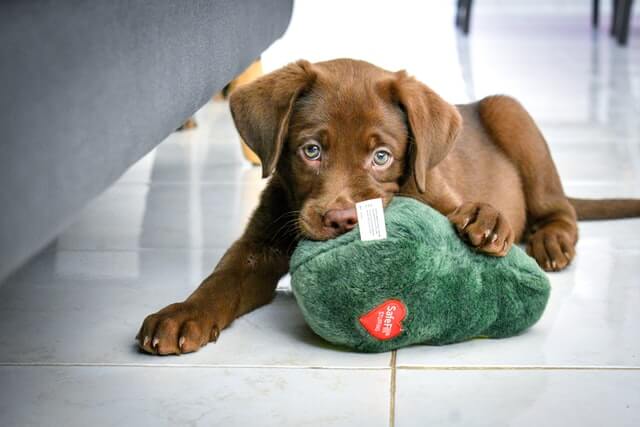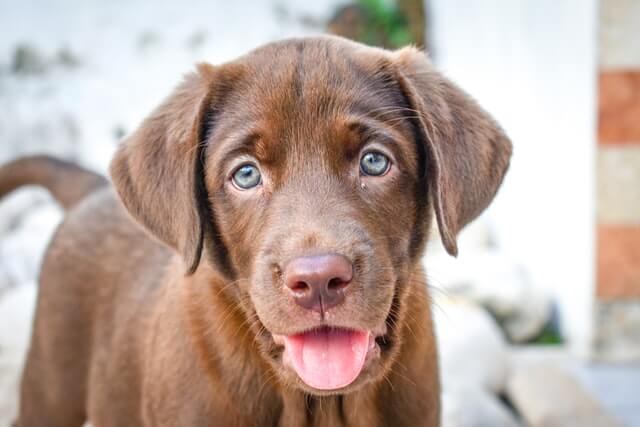It’s time! If you’re picking up a new labrador retriever from a breeder, it’ll likely be around the 8-week mark. It’s probably a moment you’ve looked forward to and are excited to meet your new puppy. But what can you expect from your puppy? And, importantly, what should the puppy expect from you?
During this stage in a lab’s life, they’ll have unique nutritional, mental, and physical requirements. Meeting these requirements will help guide your lab to being a healthy, well-mannered, confident partner in your life.
Knowing what to expect can help set you (and your puppy) up for success! By the end of this post, you’ll have learned about:
- The puppy’s physical and mental development,
- Their nutritional and physical needs,
- The importance of socializing your puppy,
- How to house and crate train your new best friend, and
- How to sleep through the night (eventually)
Let’s get started!

Table of Contents
Understanding Your Lab’s Physical Development
When you pick up your puppy at eight weeks, he or she will likely be around 10-12 pounds. A tiny size they’ll soon outgrow! In fact, your puppy will likely gain two or three pounds a week during its initial growth spurt.
This early period of intense growth starts around the eighth week of their life and lasts until they’re about six months old. Puppies have unique nutritional needs. To learn about what a labrador puppy needs to develop happily and healthily, check out this post on the nutritional needs of a lab puppy.
At this point, their sight and hearing will be fully functional. They’ll be eager to explore, run around, and will tire out incredibly quickly. You’ll have an over-excited puppy one moment and have him or her asleep on your lap in a matter of seconds.
Remember, puppies don’t have hands. The way they explore the world is by using their mouths. They’ll get a sense of what things feel, smell, and taste like. Keep a particularly close eye on your puppy as they’re exploring. There are many things that seem harmless that may actually be very harmful to your new lab.
For example, many common houseplants are poisonous to dogs. Be mindful of what your dog is doing (and what he or she is putting in their mouth). It’s better to err on the side of being overly cautious. Remove the temptations and risks and you’ll have a much more relaxed time.

Understanding Your Lab’s Mental Development
Physically, your dog is going through tremendous growth. This is also true for their mental development! Keep in mind, however, that your puppy is still incredibly young.
They’ll have very short attention spans, often under five minutes. This means that when you do engage with them in some earlier training (more on that later), try and keep the sessions short. With these early sessions (and any later ones), it’s so important to end on a win.
Your puppy will be able to learn new skills and they’ll be eager to learn, especially with yummy rewards. That said, make sure you really break down the skills. Don’t expect for them to understand how to sit immediately. Start with smaller tasks, like following a training treat in your hand in circles.
At this stage, your puppy will retain anything and everything that he learns. While this sounds great, every interaction with your puppy is a learning opportunity. Keep this in mind, as even negative habits will be retained. You’ll notice how these habits compound quickly, so be aware of anything negative your puppy picks up.
The Importance of Routine
Labradors are incredibly intelligent puppies. This means they’ll pick up on, rely on, and benefit from the routines and habits that you build for them.
When you first bring your puppy home, you’re removing them from the only family and routines they know. By building positive and consistent routines, you will help your dog transition more comfortably to his or her new home.
Time Routines
When you set a wake-up routine, which is often an important routine for your puppy, make sure you’re consistent when you wake up. For example, if you’re getting up at 6 am during the week to take your puppy out, don’t expect your puppy to understand that you want to sleep in on the weekend. The lack of consistency can be jarring for your puppy and stall progress in house training.

Location Routines
Similarly, your puppy will appreciate consistency in locations. Take them to roughly the same spot to do their business. When you feed them, feed them in the same location (like their crate). This allows them to feel much more comfortable in knowing where they should (and, importantly, where they shouldn’t) do certain things.
Instruction Routines
This will become more and more important later, as you attempt to build verbal commands but be consistent in how you give your dog instructions. Your lab will be a lifelong and enthusiastic learner. That said, being consistent removes ambiguity in the instructions your dog is looking for.
How to Get Your Puppy Used to Grooming
While you may not dive into actually grooming your puppy straight away, it’s important to build some foundational habits to get your dog comfortable with being groomed. Your puppy will likely be shy and unsure about how to respond to being touched – let alone being brushed or having their nails clipped. It’s important to start small and build on success!
Start by gently touching your dog’s back (avoiding their head at first) and speaking to them gently. Once he or she is comfortable with this, try and lay them down near your lap and give them a gentle massage. Don’t be too hard, but don’t be too soft that it’ll tickle them. Keep talking gently and calmly and let them know this is a calm and pleasant experience.
Once your puppy is used to being touched, try and introduce them to some grooming tools. For this, you can start by using a brush or a toothbrush. Let them see the brush first and get comfortable with it, then move to let them smell it. At every step of the way, reward them with training treats to let them know this is a positive experience.
Don’t push it too far! While your puppy may seem ok with seeing or smelling a brush, they may not be comfortable with being touched with it. Build this up over the course of days, not minutes. Puppies in this age are incredibly fearful – pushing them too far can set them back a lot.
Use these early weeks to get them used to grooming tools. Additionally, get them used to seeing grooming habits as a fun and rewarding experience that gives them the opportunity to bond with you.
Socialization Your Puppy
During this period, it’s important to begin socializing your puppy. Socializing allows your puppy to feel more comfortable around people and also trains them how to behave around other dogs.
Labs make wonderful family dogs. However, while this is part of their nature, it’s also a skill that needs to be nurtured and tuned. Your puppy will need to be introduced to all types of people. Your puppy will feel more comfortable with meeting people when they’re on the ground with them, rather than bending over them, which may intimidate them.
Similarly, if your pup is feeling anxious or afraid, you may need to proceed with caution. Let your dog know that it’s safe by greeting the person calmly and happily. Consider touching the other person’s shoulder, which will let your dog know that it’s safe. From there, let the dog come to you.

Your puppy will also need to experience new places. Let them explore pavement, grass, dirt, and more. By exposing them safely to a variety of different surfaces and environments, they’ll be more likely to grow into a comfortable and confident puppy.
Similarly, slowly start introducing different sounds. For example, let them know a blow dryer, a vacuum, and the lawnmower are safe. They may be afraid to simply be introduced to these objects and their loud noises. Start by using these tools in a different room (or outside) and over the course of different attempts (and days), bring them closer to build their confidence.
Socializing a Dog with Children
Socializing a dog with children can be an interesting experience. Many children will be extremely excited and have high energy, which the puppy will build off of. Never leave your puppy unsupervised around children. As your puppy won’t yet understand how to play safely, it may be important for you to intervene.
The Fear Imprint Period
During the third month of a lab’s life, they’ll be in a period known as the fear imprint period. During this time a labrador puppy is more likely to be affected by scary experiences. Because of this, it’s important to find a delicate balance between overprotecting your puppy and overwhelming them with new experiences.
The things that will cause fear may not always seem intuitive. A loud bang may lead to them being afraid of unrelated things, just because they were in the environment.

If a puppy is afraid of something, don’t immediately pet (or inadvertently reward) them. This may lead to a behavior where they feel that you want them to be afraid. If your puppy is afraid of a new experience, don’t force them into it. Wait a week or two and then try again to re-introduce that experience.
Especially during this period, avoid harsh correction during training. Your puppy will not understand yet what he or she has done wrong. Because of this, simply redirect them and try again. Reinforce the positive behavior and reward your puppy with training treats to let them know what behavior you want them to have.
Getting Your Puppy to Sleep Through the Night
During this month, your puppy will need to be taken to do their business once an hour. That said, this doesn’t mean you’ll need to get up every hour during the night. While for the first few weeks you will likely need to get up once or twice during the night, by weeks 10-12, your puppy should be able to sleep through the night.
However, to reduce your puppy’s need to go outside during the night, you can use a couple of tricks. Control and remove their water intake two hours before going to bed. Before bed, take your puppy outside one last time to relieve themselves.

If, and when, you puppy does need to go outside: take them outside but don’t make it a game. Let them do their business and then bring them right back in. By playing with them or making it an exciting experience, your puppy will think that it’s ok to go play in the middle of the night.
Puppy Proofing and Limiting Freedom
During the puppy phase, it’s incredibly important to puppy-proof your home and garden. It may seem like it’s enough to simply walk through and just remove items you think the puppy might get into. It may be helpful to get on all fours, to the puppy’s level, and explore the items you may otherwise not see.
Remember, puppies explore with their mouths. This can be destructive to your furniture or other possessions. However, your puppy getting into different items might also be harmful. Puppy proofing is about keeping your puppy safe. They don’t yet know what’s safe and they’re allowed to eat and it’s your job to make sure they don’t get hurt.

At the same time, you want to build boundaries and establish trust. By using puppy gates and playpens, you can limit the freedom of your dog. The crate can be an incredibly helpful tool to allow you to keep your puppy safe during times when you can’t give him or her your full attention.
Conclusion
The first month of having your puppy at home can be a time of overwhelming change for you and your lab puppy. Don’t let this change discourage you. By setting consistent and positive rules for your puppy, your lab will quickly learn what is expected of him or her.
During this time, your puppy will continue to grow mentally and physically. He or she will have unique dietary requirements and will need to be socialized to grow into a loving family member.
The rules, patterns, and behaviors you introduce during this time will set your puppy up for success. Celebrate the positive and redirect the negative to help your puppy learn how to be his or her best.
Disclaimer
All content on this site is provided for informational and entertainment purposes only. It is not intended to be nor can it be considered actionable professional advice. It must not be used as an alternative for seeking professional advice from a veterinarian or other certified professional.
LivingWithALab.com assumes no responsibility or liability for the use or misuse of what’s written on this site. Please consult a professional before taking any course of action with any medical, health, or behavioral related issue.
Pingback: 8-10 Week Old Puppy Schedule (With Free Download) - Living with a Lab
Pingback: How to Crate Train Your Puppy - Living with a Lab